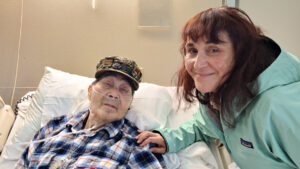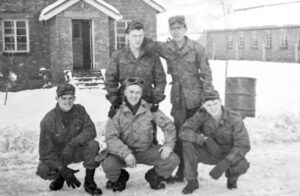Von Diaz (VD): StoryCorps’ Military Voices Initiative records and shares the stories of service members and their families.
Sergeant Daniel Moon joined the Navy in 1944 during WWII, choosing that branch because he could enlist at the age of 17. Later, he served in the Army during the Korean War..
Sergeant Moon was 96 at the time of his interview, and at StoryCorps he told his daughter Laura about a battle that continues to haunt him…
Daniel Moon: March 7, 1951 was my first day in combat. And oh, right away, bullets were flying at me. They seemed to say, pity you, pity you. That’s the sound of bullets. Like ”I pity you.” They’re sneering at me. But they all missed me. And I threw myself down in a sprawl. And in front of me, the trench line opened up like the devil opening his mouth to show his fangs.
I fired a whole half of a magazine right into that mouth. And I could see bullets hitting their winter tunics that they had on. And I could see the blinking out white tufts of cotton. And I knew they were dead. My mouth was all dry and nausea coming up, but I held it down. And then a guy shouted, ”Move over, moon!”
And all of a sudden, vroom, a huge explosion blew blood into my face and into my ear. I woke up about ten yards away on the other side of the ridge. And after I recovered and went back to the crater, I saw this group of three or four men they were blown up right at the spot where I had been.
Me, my buddies. We took our helmets off. And look down at the pitiful sight. And from that pile came this shout. ”Hey, you guys up there. When you get back home, will you write us an epitaph? Let it say. For your tomorrow, we gave our today.”
VD: That was 96 year old Sergeant Daniel Moon remembering the Korean War. After their recording, his daughter, Laura, came back to StoryCorps to reflect on their conversation, and that epitaph…
Laura Moon: I didn’t really have any expectations about what he would talk about in the conversation. I was hoping he would look back on some of the humorous things that happened.
I wasn’t really sure if we should talk about the real combat. but as it happened that’s where the interview went.
When we were growing up as kids, my dad really didn’t talk about his war experiences. maybe he didn’t want to traumatize us. And he just maybe had, um, buried them
But he had made up a poster that had the names of his buddies who had been killed. And he carried this poster every Memorial Day parade with a saying underneath it, “we gave our today for your tomorrow.” He believed his three buddies were talking to him and that is what they said.
My dad and I have not been that close all these years. And um, some of the stories that he talked about, that was the first time I had heard them.
I can now see him as a young man going through some really harrowing, harrowing things that most people can’t imagine having gone through or being in a position to have to bear.


